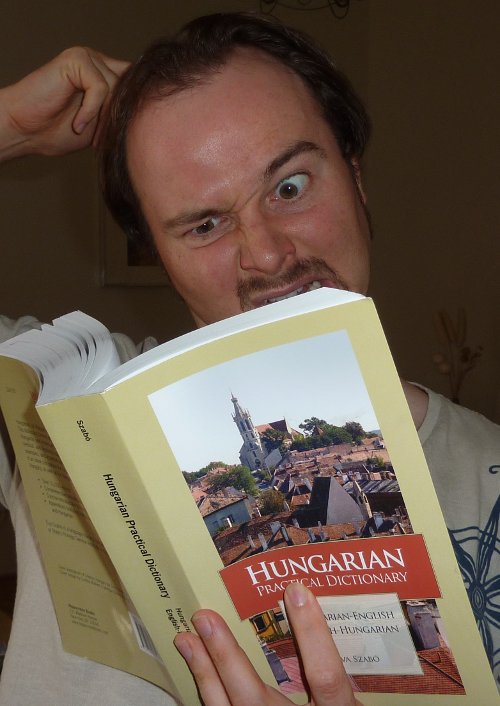What’s the hardest language to learn in the world?
If you've come here to find a detailed explanation categorising down to precisely one answer, or a small list of the toughest languages, then stop reading the post right now.
I'm not in the business of discouraging people so if you are looking for some more discouragement, you've come to the wrong place!
The term “hardest language” exists for no reason other than discouragement and it's time for me to debunk this ridiculous concept and tell you that it is bullshit. Not dog poo, not hamster droppings, BULL SHIT.
Misleading and pointless criteria
I've seen this discussion crop up many times before, and I heard it extensively when I learned one of those in the forbidden list. When a clever linguist comes along he will be very happy to list the reasons that categorise languages as difficult, but your average Joe also has something to say on this. Together their arguments include:
- Similarity to your native language
- Grammar complexity
- Tones
- Different writing system
- My friend Dave told me
- I'm learning it and my task is the hardest, even if I have no basis of comparison
- I spent six years studying it and can't speak yet! This proves that it's super hard
- It's my native language, and my ego is weak so I need validation, and speaking the “world's hardest language” does the trick!
While some of these points do have some merit and the first ones will be used in an argument, the last ones are actually the real reasons for arguing in the first place.
No matter what language you can think of (except perhaps Esperanto) I have heard someone say that it is the hardest one. Many people I have met (especially natives of the languages) have insisted that German, French, Japanese, Chinese, Hungarian, Spanish, Italian, Irish, English and many more are the hardest language in the world and been absolutely convinced of it.
It's true that if it uses the same writing system as other language(s) I know, my task will be simplified, and if I don't have to worry about tones it's an added bonus. But other writing systems are not that bad, and tones can also be learned with just a little bit of work. And of course if it happens to use some of the thousands of similar words to other languages, then my workload is reduced. And yes, a language like Czech/Polish having complex grammar like seven cases does take a bit of getting used to.
But none of these are what actually makes a language hard.
The differences don't make it difficult
No natural language in the world can ever be the hardest one because children learn them to fluency in just a few years. Icelandic? Japanese? Swahili? Any average five year old from the countries they are spoken in will show you how easily they communicate in those languages.
I really dislike lists of most difficult languages in the world, because they usually have no weight other than biased or very restricted opinion poles or listing particular aspects of languages that earn it bonus oh-noes! points. This completely ignores the most important parts of what makes a language hard.
If I, as an adult, lock myself in a room with two different courses outlining precisely how hard a language is (to be frank, that's the purpose of most courses), then the one with the most differences will be the winner. If I spend an hour a day studying my Spanish, then an hour studying Japanese, after a few weeks/months I will say Spanish is easier because of the similar words, same writing system etc.
The reason I haven't attended a full language course for years is because the purpose of a course is to show you what's different and to break a language into pieces like you might dissect a frog in biology class. When you dissect a frog, it isn't a frog any more, it's just a bunch of organs! The frog is dead.
If you're lucky, your course will give you Frankenstein powers to revive your dead frog, but my learning strategy involves starting with the live version (i.e. speak a language, not study it indefinitely) and nourishing it to help it grow.
What really makes it hard: personal context
I've said this before, but the hardest language in the world for me was Spanish. This is usually way up there for many people as the easiest (for English speakers), and yet for me it was harder than Hungarian, and even Japanese and Chinese paled in comparison to the challenge Spanish posed to me.
And yet, many people reading this will be absolutely sure that Spanish is easier than other languages. What made it hard was not the conjugations, subjunctive, accents etc.
It was me.
I made Spanish hard – I had the wrong attitude, I studied in such a way as to focus on what made it so “impossible”, when I tried to speak it I would constantly think how stupid I sounded and I kept reminding myself how hard it was.
The fact of the matter is; if you tell yourself the language is the “hardest one in the world” you are right! That mantra will keep you locked in an inescapable feedback loop that will make it the hardest language. You will set your filter to negative and find many reasons that support your claim.
German was also hard for me the first time I tried to learn it. I was bad at in school, I hated hearing the words “accusative, nominative…” and I wasn't motivated to really try. If you force me to learn a language I don't want to learn, I will inevitably dislike it and feel that it's hard. This is as true for me now as it was then.
Passion makes a language easier
The second time I took on German, even though I had an exam, my motivation to learn was to speak with human beings. When I think of German, I don't think of cases, verbs, genders etc. I think of the cool people I met in Berlin. This is what a language is really about.
Chinese will be easier for someone to learn if they are interested in Chinese culture, moving to the country, discovering their roots etc. Lack of passion will make any language harder – this is independent of your native language and the differences. If a Spanish speaker was passionate about all that anime they have been watching and dreamt of living in Tokyo some day and was doing everything in their power to make this happen, then Japanese would be easier for them to learn than French would, especially if they weren't truly motivated to learn French.
Time wasted can also be a demotivator. The reason I can take on a language in “just three months” is not because of exposure to a radioactive spider. If you spend “six years” learning a language you actually just spend an hour or so a week in many cases. At best that adds up to a month in total over several years. It counts as even less if you aren't giving it your full undivided attention. Saying that it takes two or five or ten years to learn a language is meaningless because most of that time will actually be spent in your native language.
Think of the minutes you put into your language, not the years.
Focusing on the positive makes a language easier
This second time round with German, as I studied I would focus on why the language was easy and this helped me immensely to speak it and even pass the majority of one of the hardest exams in the world for German. In fact, I've compiled all of those reasons and put together a Why German is Easy guide for anyone learning German and who thinks it's hard. Focusing on these reasons and building on them will make the language easy and help people master it quicker.
I have decided from the very start that Hungarian (which is on some of the many random lists as “hardest language” in the world) is easy. I am looking for evidence that supports this and am finding it. Whether it's easier than Spanish or Irish etc. is irrelevant because I am in Budapest and I need to speak Hungarian. If I could prove that Hungarian was the hardest language in the world (which is so objective to be nothing more than a linguist's mental masturbation if you ask me) then how could that possibly help me to speak it? That can only demotivate me.
Linguists are welcome to argue over what the hardest language to learn is, but I don't learn languages, I speak them. When you learn a language, all you are focused on is the details of what makes it different. Most courses are basically just lists of reasons why it's different. When you speak it, you have the context and the human beings to help you to make it easier. If you want to speak a language, stop focusing on pointless pissing-contests and just speak it!
Think what you like, but don't tell others what the hardest one is
Before you answer with “No, but you don't get it, Japanese/Finnish/etc. is the hardest” just think about the following:
- Do you speak every single language in the world? All 6,000+ of them? All fluently? Great! Now I care what you have to say. If not, your basis of comparison is nothing more than theory and biased speculation.
- Are you me, in my situation, with my motivation, feel my passion and have my native friends? No? OK, then stop presuming you know how I should think 😉
- Are you ready to give me a list of 1,000 reasons why that language is hard? Of course you are – but aren't you forgetting the 10,000 reasons why it's easy? Every language is missing many many things that makes other ones harder.
- Have you been studying the language for decades with the most advanced learning materials? Sounds like fun(!), but tell me how much you can sing in the language, how much you've flirted in that language and how many times you've ordered lunch in that language?
A language is not an academic subject, it's a means of communication between human beings. Communication is hard for reasons of shyness, inexperience, no good motivation and lack of confidence. By propagating this myth of hardest language you are doing nothing more than adding to people's lack of confidence.
Of course, you are free to continue thinking that language is the hardest one in the universe, but stop going around demotivating everyone else. While you are busy telling us how hard it is, some of us are simply busy speaking the languages. Stop interrupting us please 😉




Social